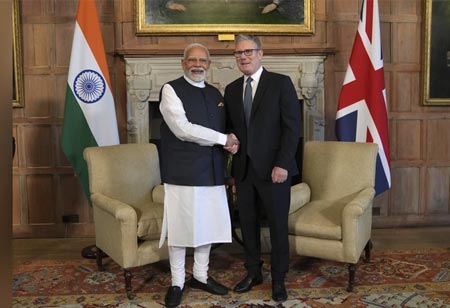
Prime Minister Narendra Modi, said that several of India's main sectors are to benefit from the India–UK Comprehensive Economic and Trade Agreement (CETA) signed recently, which will position the nation to be an even stronger player as a global manufacturing base.
The trade deal, signed during PM Modi's two-day UK trip with British Prime Minister Keir Starmer, is expected to provide a major boost to bilateral economic partnership and trade. Modi had referred to the deal as a "new chapter" in India–UK relations that will drive inclusive growth and provide more opportunities for farmers, youth, MSMEs, women, and professionals.
Labor-intensive and export-oriented sectors such as textiles, leather and footwear, fishery products, gems and jewellery, organic chemicals, plastics, autoparts, handicraft products, and services are expected to experience high growth in the post-reform regime.
Also Read: India-UK FTA 2025, Tariff Cuts, Big Gains, and What's Next?
The agreement, with significant reductions in tariffs on everything from apparel to automobiles and whiskey, will increase market access and strengthen trade relations between the world's fifth and sixth largest economies. Two-way trade between India and the UK was $21.9 billion in 2024 and set to rise by another $34 billion by 2040.
PM Modi further added that the CETA would support the Make in India initiative and export-driven growth, and also deliver quality products at affordable prices to Indian consumers.
The historic accord will only serve to further the economic ties, establish fresh avenues for trade, and enhance strategic alliance between the two democracies in the years ahead.
We use cookies to ensure you get the best experience on our website. Read more...